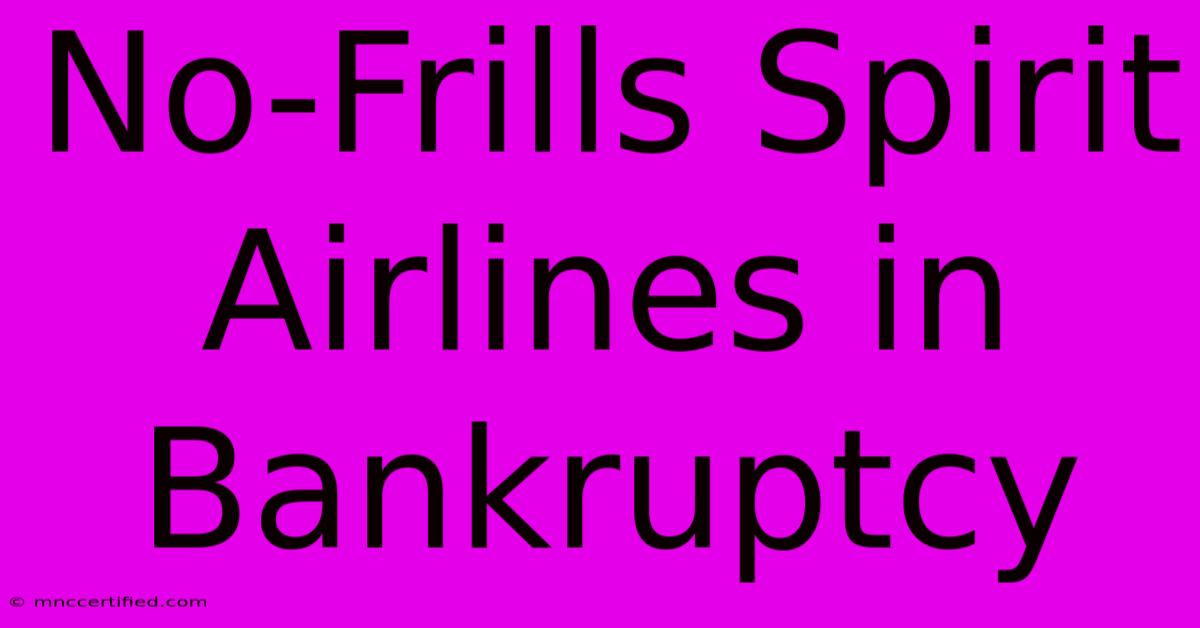No-Frills Spirit Airlines In Bankruptcy

Table of Contents
No-Frills Spirit Airlines and the Specter of Bankruptcy: A Deep Dive
The budget airline industry is notoriously volatile, and Spirit Airlines, known for its ultra-low fares and "no-frills" approach, has recently faced significant headwinds. While Spirit Airlines hasn't filed for bankruptcy yet, persistent rumors and financial struggles have led many to speculate about its future. This article will delve into the factors contributing to these concerns, examining Spirit's business model, its challenges, and the potential implications of a hypothetical bankruptcy filing.
Spirit Airlines' Business Model: A Double-Edged Sword
Spirit's success hinges on its ultra-low-cost carrier (ULCC) model. This strategy prioritizes minimizing operational costs, often at the expense of passenger comfort and convenience. Key elements of this model include:
- Unbundled Pricing: Spirit charges separately for almost every extra, from baggage fees to seat selection and even onboard beverages. This allows them to advertise incredibly low base fares, attracting price-sensitive travelers. However, the final cost can often balloon beyond expectations.
- Point-to-Point Routing: Rather than focusing on connecting flights through hubs, Spirit operates primarily point-to-point routes, minimizing operational complexity and aircraft turnaround times.
- Highly Efficient Operations: Spirit employs strategies to maximize aircraft utilization and minimize ground time, contributing to cost savings.
This model, while successful in attracting budget-conscious flyers, also presents significant vulnerabilities.
Challenges Facing Spirit Airlines: A Perfect Storm?
Several factors have combined to create a challenging environment for Spirit Airlines, raising concerns about its long-term viability:
1. Rising Fuel Costs: A Major Blow to Profitability
Fuel is a substantial expense for any airline, and Spirit, with its large fleet, is particularly susceptible to fluctuations in fuel prices. Soaring fuel costs directly impact profitability, squeezing already thin margins.
2. Intense Competition: The Budget Airline Battleground
The budget airline sector is incredibly competitive. Spirit faces stiff competition from other ULCCs like Frontier Airlines and Ryanair, as well as legacy carriers offering discounted fares. This competitive pressure forces Spirit to keep fares low, impacting revenue generation.
3. Economic Slowdown and Reduced Travel Demand: A Macroeconomic Headwind
Economic downturns directly affect consumer spending, including discretionary spending on travel. A weakening economy often leads to reduced travel demand, forcing airlines to lower prices further or risk empty seats.
4. Labor Relations and Operational Disruptions: Impact on Efficiency
Labor disputes and operational disruptions, such as pilot shortages or mechanical issues, can significantly impact airline efficiency and profitability. Maintaining positive labor relations and ensuring smooth operations are critical for Spirit's success.
The Potential Impact of a Bankruptcy Filing: What Would Happen?
While Spirit Airlines has not filed for bankruptcy, a hypothetical scenario would have several significant consequences:
- Flight Cancellations and Disruptions: A bankruptcy filing would likely lead to immediate flight cancellations and operational disruptions, stranding passengers and causing significant inconvenience.
- Job Losses: Employees across all departments would face potential job losses.
- Restructuring and Asset Sales: The airline would undergo restructuring, potentially involving asset sales (aircraft, routes, etc.) to pay off creditors.
- Impact on Creditors and Investors: Creditors would likely experience losses, and investors would see a significant devaluation of their holdings.
- Potential Acquisition or Liquidation: The most likely outcomes would be a potential acquisition by another airline or liquidation of the company's assets.
Conclusion: Navigating Uncertain Waters
Spirit Airlines' future remains uncertain. While the airline has not yet filed for bankruptcy, the challenges it faces are substantial. The interplay of high fuel costs, intense competition, economic fluctuations, and operational challenges create a complex situation. Whether Spirit can successfully navigate these headwinds and maintain its position in the fiercely competitive budget airline market remains to be seen. Close monitoring of its financial performance and strategic decisions will be crucial in determining its long-term viability. Regularly checking financial news sources and industry reports provides the best source for up-to-date information.

Thank you for visiting our website wich cover about No-Frills Spirit Airlines In Bankruptcy. We hope the information provided has been useful to you. Feel free to contact us if you have any questions or need further assistance. See you next time and dont miss to bookmark.
Featured Posts
-
Near Record Thanksgiving Travel 80 Million
Nov 19, 2024
-
Dune Prophecy Review Sisterhoods Gloom
Nov 19, 2024
-
Whats On Cny Thanksgiving 2024
Nov 19, 2024
-
Bankruptcy Filing Spirit Airlines Flights On
Nov 19, 2024
-
Poland Vs Scotland Live Nations League Result
Nov 19, 2024